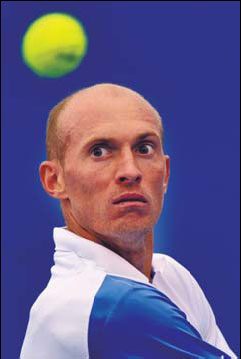Persistent corruption fears haunt tennis
Persistent corruption fears are troubling tennis after several players were contacted by investigators and as rumors fly of unusual results and suspicious betting patterns.

Rising Ukrainian star Alexandr Dolgopolov confirmed he was among the players to receive a letter from the Tennis Integrity Unit (TIU), an anti-corruption squad headed by an ex-Scotland Yard detective.
Dolgopolov, speaking during last month's Australian Open in Melbourne, said some Russian players had also been contacted. There is no suggestion Dolgopolov or the other players are suspected of wrongdoing.
"I wasn't really surprised because I knew some guys, you know, like Russian guys, they got those letters," Dolgopolov said.
The content of the letters has not been disclosed.
Corruption allegations - which come after a spot-fixing scandal left three Pakistan cricketers banned and facing criminal charges - tend to focus on surprising results, often in obscure tournaments, which attract large bets.
In 2008, Russia's Nikolay Davydenko was cleared after a long-running probe into a match he forfeited in Poland which drew big wagers, prompting betting exchange Betfair to void all bets.
Last July, Britain's Daily Mail said officials were investigating a win by 370th-ranked Richard Bloomfield in Rhode Island, which attracted 1 million pounds ($1.6 million) in bets.
An Italian website said investigators were also looking into irregular betting patterns surrounding a match in St. Petersburg in October.
Serbia's 52nd-ranked Janko Tipsarevic, another player to be contacted by the TIU, has denied any wrongdoing in his defeat to world No 98 Horacio Zeballos in October.
"I said to the Tennis Integrity Unit that I have no problem, they can send me a letter every week if they want," he told Italy's www.ubitennis.com website.
"All it needed was a phone call to my bank, to my phone company and I gave them everything. Easy, just took seven days, I sent them my account, the telephone list, everything they wanted, what's the problem?"
A well-placed source in the bookmaking industry said tennis officials were investigating about 10 suspicious cases from recent months, indicating the possible scale of the problem.
He said that in the past decade Internet betting had fuelled an explosion of cases where gamblers were placing large wagers on unexpected outcomes, in low-profile matches, and winning.
"There's a deep, dark world out there," the source, who did not want to be named, said. "You could spend forever on betting sites, spotting trends and see times where there are unusual patterns going on.
"It very rarely involves the top players and it very rarely involves the late stages of tournaments," he said.
"It tends to happen in the early rounds of obscure tournaments. It doesn't happen in Grand Slam finals or Grand Slam semifinals."
The source said the matches often involved players from eastern Europe or South America. But he said leaks were often believed to come from support staff, rather than players themselves.
"We found a lot of matches where the winning players were pulling out before the end of the game," he said.
"The information we got was people on the inside - trainers, physios, coaches - who were sitting and watching a guy getting his hamstring massaged every day, were passing the information on."
Worries over corruption prompted the TIU's creation in 2008, headed by former British detective Jeff Rees.
Last year, its investigations ended with a fine and suspension for Austria's Daniel Koellerer for putting odds and links to betting sites on his website.
Russian player Ekaterina Bychkova was also fined and suspended for failing to report an approach to influence a match.
"The TIU ... is concerned by attempts to influence players and other parties to provide inside information or to influence the results of matches or incidents within matches that would provide unfair advantage to gamblers," a spokesman said.
According to the bookmaking source, the anti-corruption team faces an uphill battle in catching cheats, as it's often hard to link a player or staff to money being wagered.
"I think the ATP are trying to do their bit to stamp it out but the problem is, unless you have phone records or a money trail it's almost impossible to do," he said.
"Unless you can prove there's a connection between the player and the money that's being placed, how do you prove it?"
Meanwhile corruption claims have provoked disquiet among tennis's senior representatives, including 16-time Grand Slam winner Roger Federer.
"I don't know if I get more angry or disappointed. It's just a pity to a game that has given us everything. Why would you want to play with that?" Federer said.
 0
0 







Go to Forum >>0 Comments